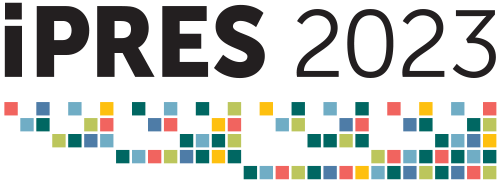Server-Side Web Archiving Using ReproZip-Web
Presenter(s): Katherine Boss, Vicky Rampin, Remi Rampin, and Ilya Kreymer Abstract: Current client-side, or “static,” web archiving crawlers have been tremendously successful in capturing and archiving millions of pages of the internet. Unfortunately, over the decades the web has evolved beyond the reach of many of these crawlers, and today’s static crawlers fail to capture […]
TUTORIAL: GETTING RUNNING WITH ARK PERSISTABLE IDENTIFIERS
Presenter(s): John Kunze and Donny Winston Abstract: This half-day (3-hour) tutorial is a pragmatic introduction to the Archival Resource Key (ARK), a 22-year-old, non-paywalled identifier scheme that is widely used for persistent access to cultural and scientific information. By the end of the tutorial, attendees will know when this highly flexible scheme is appropriate to […]
All Together Now – 2
Title: Documentation Good Practice: Bringing Order in Disruptive Times Author(s): Jenny Mitcham Abstract: In times of disruption we need to do the less interesting parts of our job better than ever. Documentation falls into this category – a sometimes neglected task that is often sidelined in favor of new and exciting innovations or even just […]
Immersive Information – 2
Title: Long-Term Preservation of a Software Execution State Author(s): Rafael Gieschke, Klaus Rechert and Euan Cochrane Abstract: Software is a very complex product, offering an endless number of different states and appearances. To foster academic discussion about software-based cultural and scientific phenomena like computer games, digital art or scientific computational models it is necessary to […]
From Theory to Practice – 5
Title: Be careful what you campaign for: How formal organization practice may negatively impact adaptability aspects of preservation Author(s): Daniel Steinmeier Abstract: Digital preservationists often struggle using their expert knowledge to create change within their own organization. Because of this, they might need to resort to campaigning for decision-making authority. Why is this? Memory institutions […]
From Theory to Practice – 4
Title: IPARO: InterPlanetary Archival Record Object for Decentralized Web Archiving and Replay Author(s): Sawood Alam Abstract: We proposed a decentralized version tracking system using the existing primitives of IPFS and IPNS. While our description talks primarily about archived web pages, we proposed the concept of IPMT and namespacing so that it can be used in […]
From Theory to Practice – 1
Title: 2013 – 2023: A Review of Ten Years of Email Archiving in France Author(s): Marion Ville Abstract: Emails are an essential medium of communication. Their management is an organizational, security, legal and financial issue for all organizations.The interdepartmental digital archiving Vitam program, which develops a digital archives management system on behalf of the French […]
Sustainability – 4
Title: The Curricular Asset Warehouse At The University Of Illinois: A Digital Archive’s Sustainability Case Study Author(s): Remco van Veenendaal, Lotte Wijsman, Jacob TakemaKarin Hodgin Jones, Jimi Jones, Robyn Bianconi and Liam Moran and Marin Rappard Abstract: What happens to the devices that host digital objects – hard drives, monitors, computer peripherals, storage media – […]
Sustainability – 2
Title: Repository Staff Perspectives on the Benefits of Trustworthy Digital Repository Certification Author(s): Rebecca D. Frank Abstract: This paper reports on the results from a qualitative study that asks whether and how staff members from TRAC certified repositories find value in the audit and certification process. While some interviewees found certification valuable, others argued that […]
Sustainability – 1
Title: I Got A Letter From My Past Self: (Un)managed Change and Provenance Author(s): Rhiannon Bettivia, Yi-Yun Cheng and Michael Gryk Abstract: Significant properties (sigProps) research often focuses on the preservation targets. Yet research consistently shows that what is significant about an object is not necessarily inherent to objects. Simultaneously, sigProps research does not adequately attend […]
